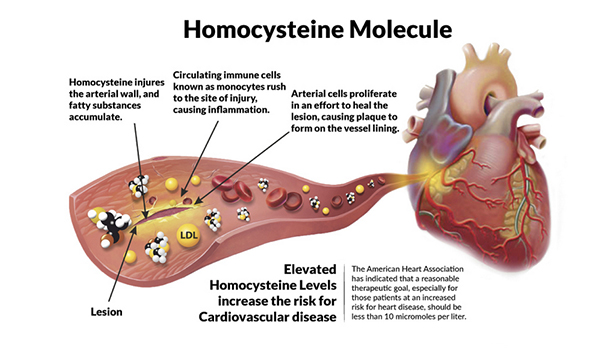
Homocysteine – the little known killer
Few people are aware that Homocysteine, a blood amino acid, is far more likely to cause heart disease than cholesterol. In fact, a 2002 study published in the British Medical Journal found that a 5% increase in blood homocysteine levels increased the risk of heart attacks by 42%, strokes by 65% and deep vein thrombosis by 60%!1.
Another study, involving 1158 women and 789 men, showed that raised homocysteine levels are a better indicator of heart disease than high blood pressure, cholesterol level, a stroke victim’s age (each year adds ±6% higher risk) and even whether they smoked or not.2
It was first commented on in 1969 by a Dr. K.S. McCully but it wasn’t till the early 1990’s that medical science started taking notice. Today there are over 11,000 studies on homocysteine and it’s been found to be an important contributor to Alzheimers, migraines, macular degeneration, hearing loss, depression, as well as cardiovascular disease.
The preoccupation with cholesterol, and the attendant multi-billions earned from combating it, have unfortunately resulted in many people never having had their homocysteine levels checked. There are still many MDs who appear to know little or nothing about the dangers of elevated homocysteine levels and so never check patients’ blood levels for this dangerous killer.
Just how dangerous it is, is illustrated by the fact that, in the U.K. the average adult’s blood levels are around 11mmol/l. The ideal should be below 6, so the average British person already has a 100% increased risk of cardiovascular disease. If the levels are around 16, that risk increases by 400%.The longer the levels are raised, the worse the risk becomes. In the study mentioned above2, people whose levels were 14 had an 82% increased rate of strokes after seven years compared to those whose levels were less than 9.2.
Homocysteine is produced as a byproduct of protein metabolism, especially methionine. This is found in meats, dairy products, eggs and seafoods. With the current popularity of high protein diets, like the Paeleo diet, this could become an even bigger problem.
Homocysteine is easy and relatively cheap to control with nutrients, expensive drugs are not needed. The B-vitamins, in particular, are especially effective in controlling homocysteine levels, along with magnesium3. Omega 3 fatty acids have also been shown to play a role in lowering homocysteine levels4, as does exercise5.
To sum up, elevated homocysteine levels are dangerous and increase the risk of heart disease significantly. The good news is that it’s relatively easy to lower and control the blood levels by –
1) Eating a healthy diet containing an abundance of fruit, vegetables and pulses (chick peas, lentils and beans – all good sources of protein). Reduce the amount of meats, saturated fats and processed foods. Patrick Holford in his book ‘Food is Better Medicine than Drugs recommends the following –
- Eat less fatty meat and more fish and vegetable protein
- Eat your greens
- Have a clove of garlic a day
- Cut back on caffeine and alcohol
- Reduce stress
- Stop smoking
2) Supplement with:
– a good natural, whole food derived Vitamin B Complex. Several studies have shown that synthetic Vitamin B has little effect.
– Omega 3 (look for one that contains all 8 omega factors, not just DHA & EPA).
– Magnesium (look for a double amino acid chelated product, as this significantly increases absorption).
3) Exercise more. Just a 30min brisk walk 3-4 times a week can do wonders for your health.
For more information on health go to the Health News page
References
1 D.Wald et al. British Medical Journal, 2002, vol. 325, pg 202
2 Sakar & Lambert. International Journal of Clinical Practice, 2001, vol. 55(4), pg 262-8
3 J.Spence et al. Stroke, 2005, vol. 36(11), pg 2404-9
4 Tao Huang et al. Nutrition, 2011, vol 27(9) pg 863-867
5 S. Harpal et al. Journal of Clinical Endocrinology & Metabolism, vol 87(10) pg 4496–4501
Excellent and helpful 3 articles on Heart, HT and cholestrol Patrick. Encouraging.
Will tweak my protocol and also work on the stress factor.
Found it interesting that liver controls cholestrol.
I have a marginal non-alcoholic fatty liver, so need to research more to find out why.